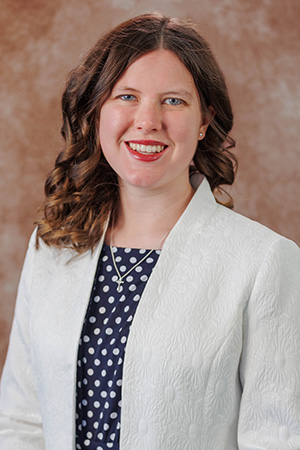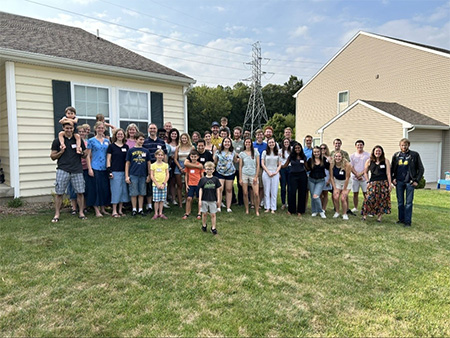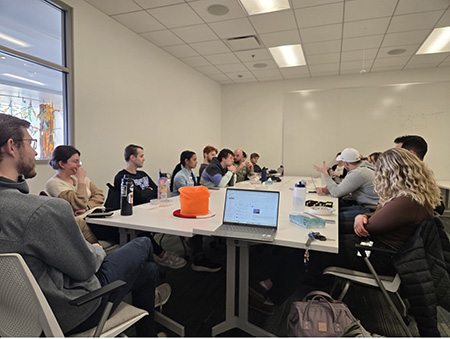Student Spotlight
As she chases her dream of becoming a caring and compassionate physician, Kayla Grooters’ Christian faith is pivotal in that pursuit and, she says, the foundation of her life.
Her faith has carried her to where she is now – entering her final year of studies at Western Michigan University Homer Stryker M.D. School of Medicine (WMed) and on the cusp of becoming an Internal Medicine and Pediatrics physician. That faith has also fueled Grooters as she has played a central role in reviving WMed’s chapter of the Christian Medical and Dental Association (CMDA) and established herself as a student leader for CMDA at the state and national levels.

“I really wanted to create something that was going to provide some permanent fellowship and permanent community at WMed,” said Grooters, a native of Findlay, Ohio, who came to Kalamazoo in 2022 as a member of the MD Class of 2026 after earning a bachelor’s degree in biomedical science with an emphasis in microbiology at Grand Valley State University.
“What ended up happening exceeded my wildest expectations,” she said.
The story of Grooters’ involvement with – and investment in – the CMDA chapter at WMed really began during her time as an undergraduate at GVSU. It was then, she said, that she truly rediscovered her relationship with Jesus after years of minimal involvement in the church. She joined Cru Ministries at GVSU, became a part of an honors college bible study, and spent 10 weeks in Spain with Greater Europe Mission (GEM) where she worked in a food truck and coffee shop along El Camino de Santiago. She also prayed with people from more than 150 countries, listened to their stories, and washed their feet.
“My time in Spain really taught me how to meet people in difficult moments and support them where they’re at,” Grooters said.
Grooters said she valued the sense of community and fellowship she experienced during her time at GVSU and overseas. When she arrived at WMed in the summer of 2022 though, she found an academic landscape heavily impacted by the COVID-19 pandemic that allowed for little face-to-face time with her classmates.
“I went through that first year without any real sense of community or connection outside of our classes,” she said. “That was really hard on me and I got to the end of that first year feeling very lonely.”

For Grooters, though, that sense of loneliness began to fade when – at the start of her second year at the medical school – she received an email message seeking students who might be interested in restarting the CMDA student interest group at WMed.
She jumped at the opportunity and joined four other students in hosting meals twice a month at the W.E. Upjohn M.D. Campus along with a video bible study course. They also did the work to change CMDA at WMed from a student interest group into a student organization and registered the chapter with the CMDA’s office for the Midwest region.
By the fall of 2023, she learned that the CMDA Midwest Fall Conference was held annually in Muskegon and that WMed students had never attended. That prompted her to begin working with the Midwest region director for CMDA to promote the event to medical students.
“I made it my mission to encourage more student participation in the organization,” Grooters said. It’s an organization that I love because it provides lifelong fellowship and connections for students.”
Grooters’ hard work paid off and with the help of her classmates, as well as Abigail Solitro, PhD, and Michael Trexler, MD, who serve as faculty advisers for the CMDA chapter at WMed, interest among students grew exponentially. In the summer of 2024, the group hosted a summer kickoff that attracted more than 50 students, faculty, staff, and their family members. In the fall of 2024, more than 10 WMed students attended the regional conference in Muskegon and overall participation in the conference doubled from the previous year.
Even more, just over two years after she began her work with CMDA, WMed now boasts the most active chapter in the state of Michigan and is among the top five most active chapters in the entire Midwest.
“I would just like to emphasize that all of this was an answer to prayer,” Grooters said. “While we did many things, none of them would have worked had it not been for God's grace and patience with us. He put it on our hearts to do it, and so we did it … We exist to represent Christ and His mission of healing, grace, and peace on our campus, in our clinics, and in our community, and to make Him known to all who seek him.”

The success at WMed hasn’t gone unnoticed. Last year, Grooters was named the Michigan State Student Representative for CMDA, a role in which she helped coordinate student chapters at health professional schools throughout the state, including the launch of two new chapters in Michigan. She was also recently featured on the CMDA Pulse Podcast where she talked about the growth of the CMDA chapter at WMed.
More notably, in November, Grooters was invited to apply for a national trustee position with CMDA and was selected for the role this year. She will hold the position for one year.
“It has all been a huge blessing,” Grooters said.
As she steps into a role that makes her the student voice for CMDA at the national level, Grooters said she hopes her work will represent Christ and her fellow student members well. She also wants to help increase student engagement with CMDA and encourage and connect students with career paths that honor their faith and mentors that will help them in their pursuit of their chosen specialties.
She said interest in the CMDA at WMed continues to grow and she serves as a mentor for preclinical students who are now leading the chapter she helped restart in 2023. The group holds a Friday afternoon bible study at the W.E. Upjohn M.D. Campus that typically draws at least 20 people. They also host numerous events throughout the year, including a summer barbecue, fall bonfire, Christmas party, and worship nights.
In addition to her work at the medical school with CMDA, Grooters is also passionate about some national advocacy issues. She said she is outspokenly passionate in speaking against the legalization of physician-assisted suicide and euthanasia, and she helped start a pro-life group at WMed called White Coats for Life which seeks to advocate for the protection of all people from conception to natural death.
As she looks ahead to her final year of medical school, Grooters plans to pursue residency training in Medicine-Pediatrics after graduation and then hopes to complete a fellowship in infectious diseases.
“My journey to becoming a doctor is long and messy but it involves wanting to love people well and wanting to see every human being through the lens that Christ sees them,” she said. “Christ is the great physician, the one who was willing to touch the untouchable, comfort the mourning, and go into places and be with the people no one else wanted to be with.
“That resonates deeply with me.”
